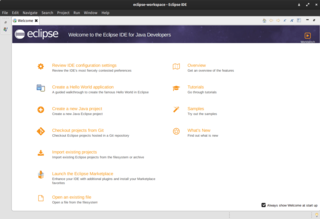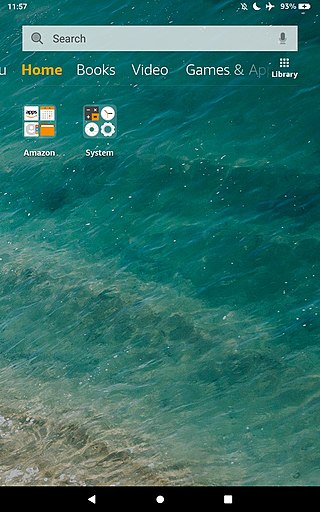
A Linux distribution is an operating system that includes the Linux kernel for its kernel functionality. Although the name does not imply product distribution per se, a distro, if distributed on its own, is often obtained via a website intended specifically for the purpose. Distros have been designed for a wide variety of systems ranging from personal computers to servers and from embedded devices to supercomputers.

KStars is a free and open-source planetarium program built using the KDE Frameworks. It is available for Linux, BSD, macOS, and Microsoft Windows. A light version of KStars is available for Android devices. It provides an accurate graphical representation of the night sky, from any location on Earth, at any date and time. The display includes up to 100 million stars, 13,000 deep sky objects, constellations from different cultures, all 8 planets, the Sun and Moon, and thousands of comets, asteroids, satellites, and supernovae. It has features to appeal to users of all levels, from informative hypertext articles about astronomy, to robust control of telescopes and CCD cameras, and logging of observations of specific objects.

Eclipse is an integrated development environment (IDE) used in computer programming. It contains a base workspace and an extensible plug-in system for customizing the environment. It had been the most popular IDE for Java development until 2016, when was surpassed by IntelliJ IDEA. Eclipse is written mostly in Java and its primary use is for developing Java applications, but it may also be used to develop applications in other programming languages via plug-ins, including Ada, ABAP, C, C++, C#, Clojure, COBOL, D, Erlang, Fortran, Groovy, Haskell, HLASM, JavaScript, Julia, Lasso, Lua, NATURAL, Perl, PHP, PL/I, Prolog, Python, R, Rexx, Ruby, Rust, Scala, and Scheme. It can also be used to develop documents with LaTeX and packages for the software Mathematica. Development environments include the Eclipse Java development tools (JDT) for Java and Scala, Eclipse CDT for C/C++, and Eclipse PDT for PHP, among others.
In software engineering, a compatibility layer is an interface that allows binaries for a legacy or foreign system to run on a host system. This translates system calls for the foreign system into native system calls for the host system. With some libraries for the foreign system, this will often be sufficient to run foreign binaries on the host system. A hardware compatibility layer consists of tools that allow hardware emulation.
Bouncy Castle is a collection of APIs used for implementing cryptography in computer programs. It includes APIs for both the Java and the C# programming languages. The APIs are supported by a registered Australian charitable organization: Legion of the Bouncy Castle Inc.
Android is a mobile operating system based on a modified version of the Linux kernel and other open-source software, designed primarily for touchscreen-based mobile devices such as smartphones and tablets. Android has historically been developed by a consortium of developers known as the Open Handset Alliance, but its most widely used version is primarily developed by Google. First released in 2008, Android is the world's most widely used operating system; the latest version, released on October 15, 2024, is Android 15.

Replicant is a free and open-source Android-based operating system that intends to replace all proprietary Android components with free-software counterparts. It is available for several smartphones and tablets. Replicant's modifications are mostly in the C programming language, and its changes are mostly to the lower-level parts of the OS, such as the Linux kernel and drivers that use it.

f.lux is a cross-platform computer program that adjusts a display's color temperature according to location and time of day, offering functional respite for the eyes. The program is designed to reduce eye strain during night-time use, helping to reduce disruption of sleep patterns.

ClockworkMod is a software company, owned by Koushik "Koush" Dutta, which develops various software products for Android smartphones and tablets. The company is primarily known for its custom recovery image, ClockworkMod Recovery, which is used in many custom ROMs.

Sailfish OS is a paid Linux-based operating system based on free software, and open source projects such as Mer as well as including a closed source UI. The project is being developed by the Finnish company Jolla.

Redshift is an application that adjusts the computer display's color temperature based upon the time of day. The program is free software and is intended to reduce eye strain, as well as insomnia.

K-9 Mail is a free and open source email client for Android. It is designed as an alternative to the stock email clients included with the platform; it supports both POP3 and IMAP protocols and supports IMAP IDLE for real-time notifications. The project is named after the Doctor Who character K9.

Fire OS is a Android-based operating system developed by Amazon for their hardware devices. Fire OS includes proprietary software, a customized user interface primarily centered on content consumption, and heavy ties to content available from Amazon's storefronts and services.

FBReader is an e-book reader for Linux, Microsoft Windows, Android, and other platforms.

LineageOS is a open source Android operating system for smartphones, tablets, and set-top boxes. It is community-developed and serves as the successor to CyanogenMod, from which it was forked in December 2016, with the source code available on both GitHub and GitLab. As of 2023, there are about 1.5 million devices running LineageOS.
Outline VPN is a free and open-source tool that deploys Shadowsocks servers on multiple cloud service providers. The software suite also includes client software for multiple platforms. Outline was developed by Jigsaw, a technology incubator created by Google.[3]

scrcpy is a free and open-source screen mirroring application that allows control of an Android device from a desktop computer. The software is developed by Genymobile SAS, a company which develops Android emulator Genymotion.

Conversations is a free software, instant messaging client application software for Android. It is largely based on recognized open standards such as the Extensible Messaging and Presence Protocol (XMPP) and Transport Layer Security (TLS).














